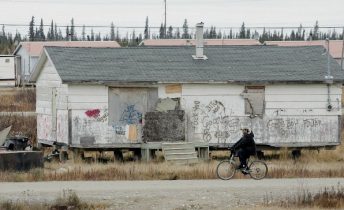Graham Lane
Despite innumerable inquiries, claimed reforms and repeated apologies, Canada’s indigenous situation remains unsettled, tragic and almost incalculably expensive. Mired in misery, far too many aboriginal people and communities remain trapped in dire situations while fundamental changes are neglected.
Canada has approximately 614 First Nations and 50 Inuit communities, many in the north. About 60% have populations of less than 500, less than 10% have more than 2,000. In northern Manitoba, there are 32 First Nation communities comprised of about 50,000 residents – probably another 50,000 reside in Winnipeg or other Manitoba cities and towns. Four of the northern communities are off the electric grid, many more rely on winter roads and air transportation for food and fuel.
The reserves are marked by inadequate housing, over-crowded living conditions, unemployment, sub-par heath and education levels, expensive groceries and over-whelming despair. And, high birth rates in indigenous communities place pressure on already inadequate services: suicide and premature death are too common. Those that leave their communities found needed services in their home communities inadequate or missing. But, not that easy for the leavers, the per capita payments from Ottawa do not ‘go’ with those that leave.
Our indigenous citizens dominate an array of dreadful categories – 90% of Manitoba’s children in care, a very large percentage of families and individuals on provincial welfare, lowest educational level, highest unemployment, highest percentage in jail are about 3% of Canada’s population but 18% of federal prisoners), highest rate of diabetes, lowest level of teeth care, lowest average age at death, highest infant mortality, and lowest average family income.
Yet the indigenous people who leave their reserves and come to the city, despite the problems they confront and endure there, do much better – employment, health, education – than those who remain on reserve.
And, there is a massive and ever-growing cost of the situation that falls on the non-indigenous population to pay. Total federal and provincial costs to serve our Canadian indigenous population already runs at about $18 billion a year. The federal government promises more. Current government support for indigenous people is about 70% higher per capita than support to the non-indigenous population. The ‘balance sheet’ suggests our indigenous citizens are a financial drag on the rest of us – much is spent with but little is coming back.
So, there are two arguments for major reform of the old but still current approach. One approach is centred on assisting our indigenous population to live better, longer, and more enjoyable lives. The second approach has our indigenous population becoming economically more productive, having employment, paying more taxes and reducing pressure on non-indigenous taxpayers. As it is, Canada is greying, with the percentage of seniors increasing year after year, increasing the overall dependency ratio.
Canada’s Indian Act and constitution blocks unilateral federal action. Somehow we have to convince indigenous leaders to give up their favourable economic and power positions and help transition their people squarely into modern Canada. The treaties and legislation should allow funds now flowing to the band council to be granted to individuals, so those leaving reserves will have the support they need when they move to cities and towns. Courage, honesty and hard work are needed.
Originally published in the Winnipeg Sun, December 23, 2016



